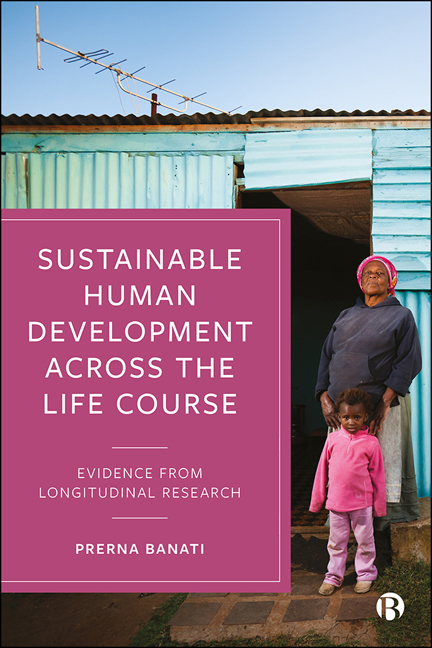Book contents
- Frontmatter
- Dedication
- Dedication
- Contents
- List of Figures, Tables and Boxes
- Notes on Contributors
- Foreword: Understanding and Enhancing Human Development Among Global Youth – On the Unique Value of Developmentally Oriented Longitudinal Research
- Introduction: Measuring Sustainable Human Development Across the Life Course
- 1 Exploring the Potential for Gender Norm Change in Adolescent Girls: Evidence from ‘Real Choices, Real Lives’ Longitudinal, Qualitative Study Data
- 2 Unequal Educational Trajectories: The Case of Ethiopia
- 3 Early Life Transitions Increase the Risk for HIV Infection: Using Latent Class Growth Models to Assess the Effect of Key Life Events on HIV Incidence Among Adolescent Girls in Rural South Africa
- 4 Achieving the Sustainable Development Goals: Evidence from the Longitudinal Parenting Across Cultures Project
- 5 Achieving Gender Equality: Understanding Gender Equality and Health Among Vulnerable Adolescents in the Sustainable Development Goals Era
- 6 Capturing the Complexities of Adolescent Transitions Through a Mixed Methods Longitudinal Research Design
- 7 Child Well-being Across the Life Course: What Do We Know, What Should We Know?
- 8 Mauritian Joint Child Health Project: A Multigenerational Family Study Emerging from a Prospective Birth Cohort Study: Initial Alcohol-related Outcomes in the Offspring Generation
- Conclusion: The Future of Longitudinal Research
- Index
3 - Early Life Transitions Increase the Risk for HIV Infection: Using Latent Class Growth Models to Assess the Effect of Key Life Events on HIV Incidence Among Adolescent Girls in Rural South Africa
Published online by Cambridge University Press: 05 January 2022
- Frontmatter
- Dedication
- Dedication
- Contents
- List of Figures, Tables and Boxes
- Notes on Contributors
- Foreword: Understanding and Enhancing Human Development Among Global Youth – On the Unique Value of Developmentally Oriented Longitudinal Research
- Introduction: Measuring Sustainable Human Development Across the Life Course
- 1 Exploring the Potential for Gender Norm Change in Adolescent Girls: Evidence from ‘Real Choices, Real Lives’ Longitudinal, Qualitative Study Data
- 2 Unequal Educational Trajectories: The Case of Ethiopia
- 3 Early Life Transitions Increase the Risk for HIV Infection: Using Latent Class Growth Models to Assess the Effect of Key Life Events on HIV Incidence Among Adolescent Girls in Rural South Africa
- 4 Achieving the Sustainable Development Goals: Evidence from the Longitudinal Parenting Across Cultures Project
- 5 Achieving Gender Equality: Understanding Gender Equality and Health Among Vulnerable Adolescents in the Sustainable Development Goals Era
- 6 Capturing the Complexities of Adolescent Transitions Through a Mixed Methods Longitudinal Research Design
- 7 Child Well-being Across the Life Course: What Do We Know, What Should We Know?
- 8 Mauritian Joint Child Health Project: A Multigenerational Family Study Emerging from a Prospective Birth Cohort Study: Initial Alcohol-related Outcomes in the Offspring Generation
- Conclusion: The Future of Longitudinal Research
- Index
Summary
Introduction
Adolescent girls and young women (AGYW) in sub-Saharan Africa are at high risk of HIV infection. HIV infection rates increase substantially among AGYW after the age of 18. In South Africa HIV prevalence rises from 6% among young women aged 15–19 years to 17% by ages 20–24. This age period marks a time of transition into adulthood and coincides with a number of key life events, such as finishing the mandatory years of schooling, leaving home, entering first sexual relationships and experiencing first pregnancies.(Human Sciences Research Council [HSRC], 2017) Key life events that include first pregnancy, coital debut, leaving school and parental death have all been found independently to be associated with an increased risk of HIV infection in young women. Young women who experience their first vaginal sex before the age of 15 are more likely to be living with HIV, and these early events are often characterized by forced sex and sex with older male partners who are more likely to be HIV infected (Pettifor et al, 2004, 2009; Wand and Ramjee, 2012). While school attendance has multiple developmental and later life benefits, leaving school increases the risk of HIV acquisition. Girls who do not attend school as often and who drop out are more likely to acquire HIV infection than those attending and who stay in school (Stoner et al, 2017) In one study, this association appears to be explained by school environments providing safer spaces where adolescent girls are more likely to have male partners closer in age and also have fewer sexual partners than those out of school (Stoner et al, 2018) Similar patterns have been observed for young women experiencing early adolescent pregnancy (before the age of 15), whereby HIV incidence is much higher, and those who experience adolescent pregnancy also have more risk factors for HIV infection such as older partners and more sexual partners (Christofides et al, 2014). Finally, loss of a parent has been found to be associated with HIV risk in young people; orphaned youth are more likely to be living with HIV and to report riskier sexual behaviour than non-orphaned youth (Operario et al, 2011).
- Type
- Chapter
- Information
- Sustainable Human Development across the Life CourseEvidence from Longitudinal Research, pp. 69 - 88Publisher: Bristol University PressPrint publication year: 2021



